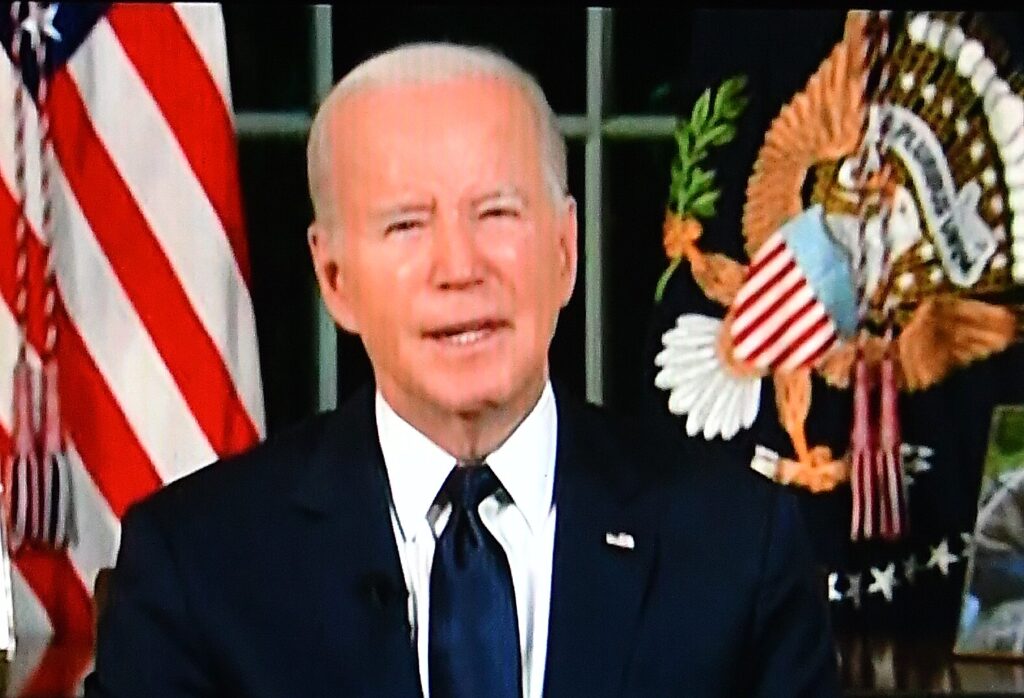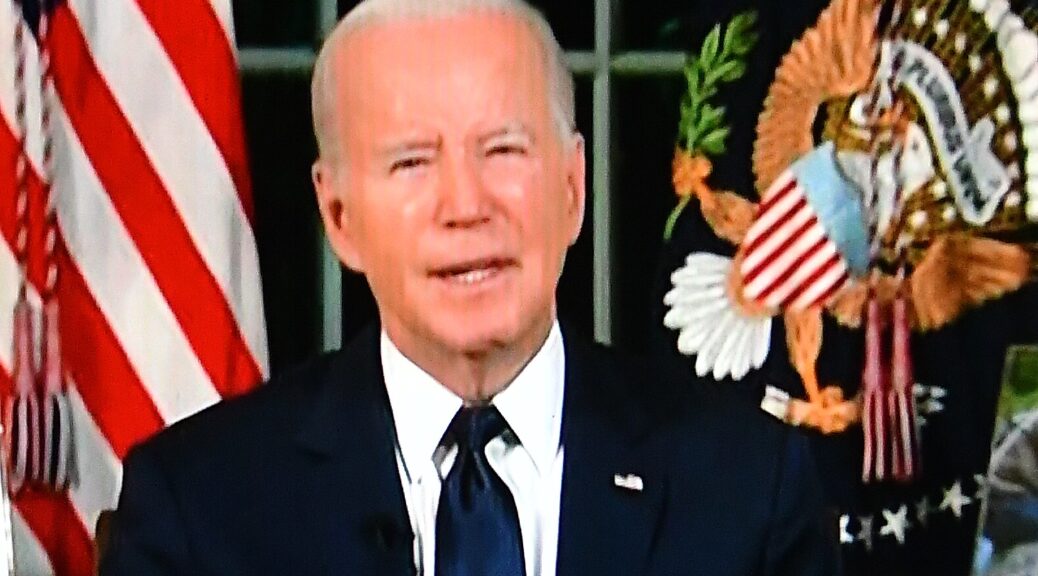
This is from President Joe Biden’s opinion column published in the Washington Post, November 18, 2023: Joe Biden: The U.S. won’t back down from the challenge of Putin and Hamas
Today, the world faces an inflection point, where the choices we make — including in the crises in Europe and the Middle East — will determine the direction of our future for generations to come.
What will our world look like on the other side of these conflicts?
Will we deny Hamas the ability to carry out pure, unadulterated evil? Will Israelis and Palestinians one day live side by side in peace, with two states for two peoples?
Will we hold Vladimir Putin accountable for his aggression, so the people of Ukraine can live free and Europe remains an anchor for global peace and security?
And the overarching question: Will we relentlessly pursue our positive vision for the future, or will we allow those who do not share our values to drag the world to a more dangerous and divided place?
Both Putin and Hamas are fighting to wipe a neighboring democracy off the map. And both Putin and Hamas hope to collapse broader regional stability and integration and take advantage of the ensuing disorder. America cannot, and will not, let that happen. For our own national security interests — and for the good of the entire world.
The United States is the essential nation. We rally allies and partners to stand up to aggressors and make progress toward a brighter, more peaceful future. The world looks to us to solve the problems of our time. That is the duty of leadership, and America will lead. For if we walk away from the challenges of today, the risk of conflict could spread, and the costs to address them will only rise. We will not let that happen.
That conviction is at the root of my approach to supporting the people of Ukraine as they continue to defend their freedom against Putin’s brutal war.
We know from two world wars in the past century that when aggression in Europe goes unanswered, the crisis does not burn itself out. It draws America in directly. That’s why our commitment to Ukraine today is an investment in our own security. It prevents a broader conflict tomorrow.
We are keeping American troops out of this war by supporting the brave Ukrainians defending their freedom and homeland. We are providing them with weapons and economic assistance to stop Putin’s drive for conquest, before the conflict spreads farther.
The United States is not doing this alone. More than 50 nations have joined us to ensure that Ukraine has what it needs to defend itself. Our partners are shouldering much of the economic responsibility for supporting Ukraine. We have also built a stronger and more united NATO, which enhances our security through the strength of our allies, while making clear that we will defend every inch of NATO territory to deter further Russian aggression. Our allies in Asia are standing with us as well to support Ukraine and hold Putin accountable, because they understand that stability in Europe and in the Indo-Pacific are inherently connected.
We have also seen throughout history how conflicts in the Middle East can unleash consequences around the globe.
We stand firmly with the Israeli people as they defend themselves against the murderous nihilism of Hamas. On Oct. 7, Hamas slaughtered 1,200 people, including 35 American citizens, in the worst atrocity committed against the Jewish people in a single day since the Holocaust. Infants and toddlers, mothers and fathers, grandparents, people with disabilities, even Holocaust survivors were maimed and murdered. Entire families were massacred in their homes. Young people were gunned down at a music festival. Bodies riddled with bullets and burned beyond recognition. And for over a month, the families of more than 200 hostages taken by Hamas, including babies and Americans, have been living in hell, anxiously waiting to discover whether their loved ones are alive or dead. At the time of this writing, my team and I are working hour by hour, doing everything we can to get the hostages released.
And while Israelis are still in shock and suffering the trauma of this attack, Hamas has promised that it will relentlessly try to repeat Oct. 7. It has said very clearly that it will not stop.
The Palestinian people deserve a state of their own and a future free from Hamas. I, too, am heartbroken by the images out of Gaza and the deaths of many thousands of civilians, including children. Palestinian children are crying for lost parents. Parents are writing their child’s name on their hand or leg so they can be identified if the worst happens. Palestinian nurses and doctors are trying desperately to save every precious life they possibly can, with little to no resources. Every innocent Palestinian life lost is a tragedy that rips apart families and communities.
Our goal should not be simply to stop the war for today — it should be to end the war forever, break the cycle of unceasing violence, and build something stronger in Gaza and across the Middle East so that history does not keep repeating itself.
Just weeks before Oct. 7, I met in New York with Israeli Prime Minister Benjamin Netanyahu. The main subject of that conversation was a set of substantial commitments that would help both Israel and the Palestinian territories better integrate into the broader Middle East. That is also the idea behind the innovative economic corridor that will connect India to Europe through the United Arab Emirates, Saudi Arabia, Jordan and Israel, which I announced together with partners at the Group of 20 summit in India in early September. Stronger integration between countries creates predictable markets and draws greater investment. Better regional connection — including physical and economic infrastructure — supports higher employment and more opportunities for young people. That’s what we have been working to realize in the Middle East. It is a future that has no place for Hamas’s violence and hate, and I believe that attempting to destroy the hope for that future is one reason that Hamas instigated this crisis.
This much is clear: A two-state solution is the only way to ensure the long-term security of both the Israeli and Palestinian people. Though right now it may seem like that future has never been further away, this crisis has made it more imperative than ever.
A two-state solution — two peoples living side by side with equal measures of freedom, opportunity and dignity — is where the road to peace must lead. Reaching it will take commitments from Israelis and Palestinians, as well as from the United States and our allies and partners. That work must start now.
To that end, the United States has proposed basic principles for how to move forward from this crisis, to give the world a foundation on which to build.

